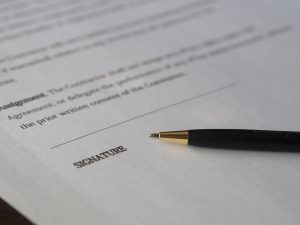
Operating Agreement: Your Complete Guide
OPERATING AGREEMENT: WHAT IS IT & WHY EVERY BUSINESS OWNER NEEDS ONE! Starting a business is exciting, but it also involves important decisions and legal considerations. One crucial document that

Like most business owners, you probably have much confidential information that you want to keep under wraps. Whether it’s trade secrets, client lists, or other sensitive data, you need to take steps to protect it from prying eyes.
One way to do that is by using a non-disclosure agreement (NDA). Data shows that over a third of businesses in the USA are bound by NDAs.
In this blog post, we’ll talk all about NDA contracts and how they can help keep your business confidential.
Keep reading to discover the utility of the NDA, and clear up any concerns or questions you might have.
An NDA contract is a legally binding agreement between two parties that prohibits the disclosure of confidential information.
NDAs are often used in business relationships, such as when a company hires a new employee or enters into a joint venture with another company. one can also use them in personal relationships, such as when two people get married or have a child together.
There are two types of NDAs: mutual and unilateral.
A mutual NDA is an agreement between two parties not to disclose each other’s confidential information. A unilateral NDA is an agreement between only one party not to reveal someone else’s personal information.
Furthermore, there are two types of confidential information that an NDA can protect:
This type of confidential information includes formulas, methods, processes, designs, or plans. It must have actual or potential economic value and be known only to a limited number of people.
Furthermore, the owner of the trade secret must take steps to protect it from being stolen or disclosed. This can include things like keeping the information confidential, using passwords, and encrypting data.
This type of confidential information includes business plans, financial statements, or marketing strategies. Unlike trade secrets, it does not have to have any economic value.
Furthermore, the owner of the proprietary information does not have to take any special steps to protect it. However, they may want to include a confidentiality clause in their contracts with employees, vendors, or other parties.
This type of confidential information includes client lists, employee records, or contact information. It does not have any economic value and can be disclosed to anyone.
Moreover, this type of information can be easily ascertained by others if it is not kept secret. The only exception to this rule is when the Confidential Information is publicly available or already known to the receiving party at the time of disclosure.
A mutual NDA is an agreement between two parties not to disclose each other’s confidential information. This type of NDA is often used in business relationships, such as when a company hires a new employee or enters into a joint venture with another company.
There are two types of mutual NDAs: one-way and two-way. A one-way NDA is an agreement between two parties not to disclose each other’s confidential information. A two-way NDA is an agreement between two parties not to reveal each other’s personal information, but only if both parties have signed the deal.
Furthermore, a mutual NDA can be either exclusive or non-exclusive. An exclusive NDA is an agreement between two parties not to disclose each other’s confidential information, and neither party will disclose the information to anyone else.
A non-exclusive NDA is an agreement between two parties not to disclose each other’s confidential information, but both parties can disclose the information to others.
A unilateral NDA is an agreement between only one party not to disclose someone else’s confidential information. This type of NDA is often used in business relationships, such as when a company hires a new employee or enters into a joint venture with another company.
There are three unilateral NDAs: superficial, intermediate, and comprehensive. A simple NDA is an agreement between only one party not to disclose someone else’s confidential information.
An intermediate NDA is an agreement between only one party not to disclose someone else’s confidential information, and the parties have a written contract outlining the personal data.
A comprehensive NDA is an agreement between only one party not to disclose someone else’s confidential information. The parties have a written contract outlining the personal data and the terms of use for the Confidential Information.
NDAs are often used in business relationships, such as when a company hires a new employee or enters into a joint venture with another company. one can also use them in personal relationships, such as when two people get married or have a child together.
NDAs are used to protect confidential information from being disclosed. Personal information can include trade secrets, client lists, financial information, and other sensitive data. NDAs can also protect proprietary information, such as patents and copyrights.
Moreover, NDAs can help to prevent lawsuits. If someone discloses confidential information without permission, the party that owns the news can bring a lawsuit against the person or company that told the information.
Using an NDA contract, both parties agree not to disclose any confidential information, so if someone breaks the agreement, they could sue them for damages.
An NDA should be used whenever there is a need to protect confidential information from being disclosed. This includes:
These are just some examples. This list is not meant to be exhaustive.
If you want to create an NDA contract, there are a few things you need to keep in mind.
First, you need to identify the parties involved and the confidential information to be protected. Next, you need to decide which type of NDA contract is best for your situation. Finally, you need to draft the agreement and have both parties sign it.
When drafting the agreement, make sure to include the following:
Once you have drafted the agreement, have both parties sign it. Make sure to keep a copy of the signed contract for your records.
If someone breaches an NDA contract, there are a few options available. First, you can resolve the issue informally by talking to the person who violated the contract and asking them to stop disclosing confidential information.
This is a formal request to stop disclosing confidential information. If the person continues to breach the contract, you can file a lawsuit against them. If this doesn’t, don’t can send a cease and desist letter.
An NDA contract is a legally binding agreement that can help to protect your confidential information. When drafting the deal, including the parties involved, the personal information that needs to be protected, and the terms of use for the Confidential Information.
Have both parties sign the agreement and keep a copy for your records. If someone breaches the contract, you can resolve the issue informally or file a lawsuit against them.
Numerous legal actions can prevent future damages or at least secure some form of compensation for what has been lost due to another’s lack of care or actions. One such legal action is the use of non-disclosure agreements.
NDAs are commonly used in business but can also be utilized between friends or family members to protect certain pieces of information from being released without prior consent.
This document establishes that both parties involved will not share any confidential data unless authorized by the other party. If someone breaks this confidentiality, they could face legal penalties for their actions.
One of the most common mistakes made with NDA contracts is not including all the required information. When drafting an NDA, make sure to include:
Another mistake often made is forgetting to have both parties sign the document. It’s essential to have a signed contract to enforce its terms. Finally, some people forget that NDAs are legally binding agreements and can result in lawsuits if violated.
There’s also the mistake of not knowing what to do if someone breaches the agreement. In this case, you should try to resolve the issue informally by talking to the person who violated the contract. You can use a cease and desist letter if that doesn’t work.
This is a formal request asking the person to stop disclosing confidential information. Finally, you can file a lawsuit against them if they continue to breach the contract.
Finally, there’s the mistake of people not knowing when an NDA is necessary. NDAs are typically used in business deals, but one can also use them between friends or family members to protect certain pieces of information.
While you don’t necessarily need don’t to help you draft an NDA, it may be helpful to have one review the agreement before finalizing it.
This is especially true if one will use the contract in a business deal. A lawyer can ensure that the agreement is legally binding and includes all the necessary information.
The business lawyer can assist if someone breaches the agreement. They can help resolve the issue informally or file a lawsuit against the person who violated the contract.
Hiring a lawyer may not be necessary, but it’s something you should consider if you’re looking to protect your confidential information.
When looking for a lawyer to help with an NDA, it’s essential to find out who has had experience in this area of law.
You can ask friends or family members for referrals or search online. When interviewing lawyers, be sure to ask about their experience with NDAs and what they would do if someone breached the agreement.
It would help if you also got quotes from several lawyers before deciding. This will give you an idea of how much the legal services will cost. It means you can choose the lawyer who is best suited for your needs and budget.
If you’re looking to protect your confidential information, hiring a lawyer to help with an NDA is something you should consider. When looking for a lawyer, it’s essential to find someone who has experience in this area of law. You can ask friends or family members for referrals or search online.
Be sure to ask about their experience with NDAs and what they would do if someone breached the agreement. Get quotes from several lawyers before deciding so that you can choose the one who is best suited for your needs and budget.
It’s essential to have a signed contract to enforce its terms. Finally, some people forget that NDAs are legally binding agreements and can result in lawsuits if violated.
When protecting your confidential information, NDA contracts are a great way to ensure that the data remains private.
By understanding the basics of NDAs and hiring a lawyer to help with the contract, you can protect yourself and your business from any potential breaches. So, if you’re looking to keep your secrets safe, an NDA is something worth considering.
If you’re interested in legal assistance with your NDAs, get in touch with us, and we will happily accommodate your pressing needs.

OPERATING AGREEMENT: WHAT IS IT & WHY EVERY BUSINESS OWNER NEEDS ONE! Starting a business is exciting, but it also involves important decisions and legal considerations. One crucial document that

84% of small businesses manage contracts without an attorney’s help. Writing a business contract can be overwhelming, but you should take some key steps to ensure the agreement is sound

Did you know that 27% of Americans said they invested in the stock market to build their personal wealth in 2022? This is the most popular wealth-building move of the

Research shows that lawyers are 86% more likely to work with privately owned companies. Many lawyers prefer working with small companies or start-ups. When starting a new business, you may

The U.S. is home to over 32 million small businesses and thousands of large businesses. Many, perhaps even most, of these businesses will sink or swim on their own merits

Partnerships. They are supposed to make a business stronger and expand faster. However, if a business falls on hard times, some partnerships can end up falling apart under pressure. Not
